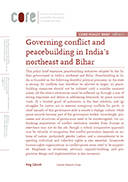This policy brief examines peacebuilding initiatives adopted by the Indian government in India’s northeast and Bihar. Peacebuilding in India is founded on the following doubtful political premises:
(a) the state is strong;
(b) conflicts may therefore be allowed to linger;
(c) peace-building measures should not be initiated until a suitable moment arises;
(d) the state’s adversaries must be softened up through a mix of strong responses and delays in addressing demands;
(e) peace accords work;
(f) a limited grant of autonomy is the best solution; and
(g) struggles for justice are in essence intergroup conflicts for parity.
A chief casualty of this governance style is society’s dialogic culture, while peace accords become part of the governance toolkit. Accordingly, processes and structures of governance need to be reinterrogated. An un-thinking importation of conflict resolution models from Europe or elsewhere may not do the job, though a critical comparative approach may be valuable. A recognition that conflict prevention depends on notions of justice, particularly gender justice, and a commitment to respecting individual and collective rights is also essential. Grassroots human rights organizations in conflict-prone areas need to be supported. Emphasis on awareness, advocacy, capacity-building, and programme design and implementation is also necessary.







